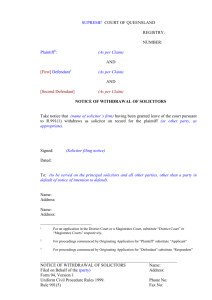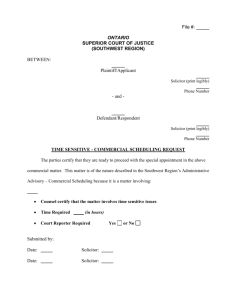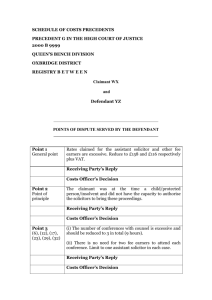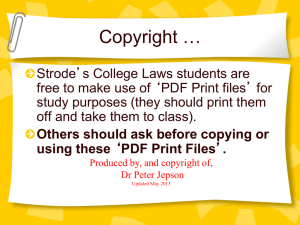Report - Centre for Socio
advertisement
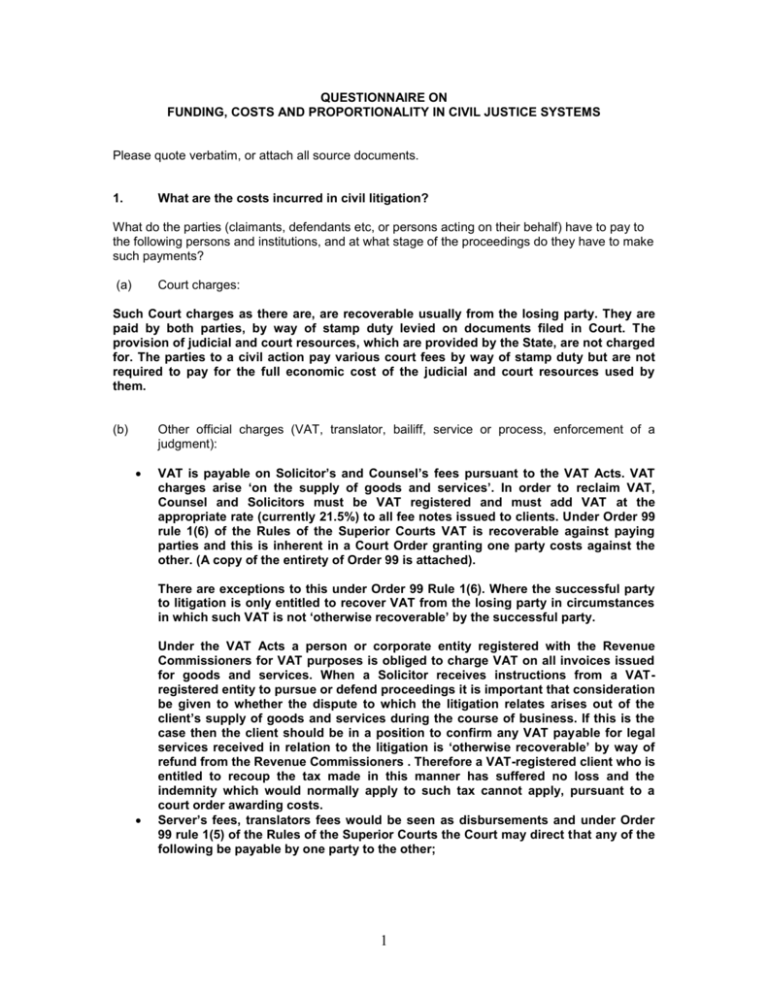
QUESTIONNAIRE ON FUNDING, COSTS AND PROPORTIONALITY IN CIVIL JUSTICE SYSTEMS Please quote verbatim, or attach all source documents. 1. What are the costs incurred in civil litigation? What do the parties (claimants, defendants etc, or persons acting on their behalf) have to pay to the following persons and institutions, and at what stage of the proceedings do they have to make such payments? (a) Court charges: Such Court charges as there are, are recoverable usually from the losing party. They are paid by both parties, by way of stamp duty levied on documents filed in Court. The provision of judicial and court resources, which are provided by the State, are not charged for. The parties to a civil action pay various court fees by way of stamp duty but are not required to pay for the full economic cost of the judicial and court resources used by them. (b) Other official charges (VAT, translator, bailiff, service or process, enforcement of a judgment): VAT is payable on Solicitor’s and Counsel’s fees pursuant to the VAT Acts. VAT charges arise ‘on the supply of goods and services’. In order to reclaim VAT, Counsel and Solicitors must be VAT registered and must add VAT at the appropriate rate (currently 21.5%) to all fee notes issued to clients. Under Order 99 rule 1(6) of the Rules of the Superior Courts VAT is recoverable against paying parties and this is inherent in a Court Order granting one party costs against the other. (A copy of the entirety of Order 99 is attached). There are exceptions to this under Order 99 Rule 1(6). Where the successful party to litigation is only entitled to recover VAT from the losing party in circumstances in which such VAT is not ‘otherwise recoverable’ by the successful party. Under the VAT Acts a person or corporate entity registered with the Revenue Commissioners for VAT purposes is obliged to charge VAT on all invoices issued for goods and services. When a Solicitor receives instructions from a VATregistered entity to pursue or defend proceedings it is important that consideration be given to whether the dispute to which the litigation relates arises out of the client’s supply of goods and services during the course of business. If this is the case then the client should be in a position to confirm any VAT payable for legal services received in relation to the litigation is ‘otherwise recoverable’ by way of refund from the Revenue Commissioners . Therefore a VAT-registered client who is entitled to recoup the tax made in this manner has suffered no loss and the indemnity which would normally apply to such tax cannot apply, pursuant to a court order awarding costs. Server’s fees, translators fees would be seen as disbursements and under Order 99 rule 1(5) of the Rules of the Superior Courts the Court may direct that any of the following be payable by one party to the other; 1 “…In addition to the costs allowed on taxation as between party and party all or any other costs, charges and expenses, reasonably incurred for the purposes of the proceedings…” (c) Lawyers’ fees. Please cover all information on fee agreements, hourly rates, fixed fees, success fees, uplifts/contingency fees, pro bono, etc. and say how extensive each method is in practice, and what the size (or range) of fees are in each case: The general rule being that “costs follow the reward”. In this jurisdiction Costs include Lawyer’s fees. The award of Lawyer’s fees are subject to the discretion of the Court but are usually payable by the losing party. There is no fixed tariff for the recovery of legal costs, but if there is any disagreement in relation to any party’s costs they can be submitted to Taxation whereby the Taxation Master will assess the bill of costs at a level which he believes appropriate, based upon precedent and reasonableness. The Lawyer’s (Solicitor’s) fee is referred to as the instructions fee. The Taxing Master (who assesses costs, but has nothing to do with Tax or the Revenue) measures these fees and has the guidance of Order 99 rule 37 (22) Rules of the Superior Courts which provides that the Taxing Master must take into account matters such as the complexity of the case, its value, importance of the matter at issue, the extent of the documentation and time reasonably expended. Under Order 99 rule 11(1)(2)(3); “11. (1) On a taxation as between solicitor and client, all costs shall be allowed except in so far as they are of an unreasonable amount or have been unreasonably incurred. (2) Any costs which in the circumstances of the case are of an unusual nature and such that they would not be allowed on a taxation of costs as between party and party shall, unless the solicitor shall have expressly informed his client in writing before they were incurred that they might not be so allowed, be presumed, until the contrary is shown, to have been unreasonably incurred. (3) On a taxation as between solicitor and own client, all costs incurred with the express or implied approval of the client evidenced by writing shall be conclusively presumed to have been reasonably incurred, and where the amount thereof has been so expressly or impliedly approved by the client, to have been reasonable in amount.” In terms of the taxation of costs, the Taxing Master uses past cases of a comparable nature as a guideline but each case has its own difficulties, complexities and principles of law to be assessed. At the conclusion of a case the Solicitors file should ideally contain (to assist in assessing the instruction fee), the following; 1. Record of the initial instructions from the client. 2. Details of investigations carried out by the Solicitor. 3. Attendance notes in regards to discussions with client, experts or Counsel throughout the course of proceedings, 4. Copies of expert witness reports. 5. Copies of all correspondence with client, Counsel and inter partes. 6. Counsel’s opinion and in particular advice on proofs. 7. Vouchers for all outlays incurred. 2 It is important to have these documents in order to calculate the fee properly. Failure to keep these on file would mean the Taxing Master would not calculate the fee properly and the lawyer misses out. (d) A witness of fact: Governed by Order 99 rule 37 (8) of the Rules of the Superior Courts. Subject to the Court’s discretion on costs, a successful party is entitled to recover the expenses paid to a lay witness for attendance at Court, expenses confined to loss of earnings as a result of attending court and travelling and overnight expenses (if applicable), reasonably incurred and vouched for properly. (e) An expert: Subject to the Court’s discretion on costs an expert’s normal/usual fees for carrying out research, attendance at court or issuing reports, will be recoverable against the losing party. The expert should provide detailed particulars of their charges including; Brief description of the instructions received by the expert from the solicitors. Description of work carried out. Date work was performed. Time involved in each aspect of work. Hourly rate applicable. Qualifications of persons involved. Explanation of any expenses/outlays incurred. Costs of providing opinions concerning say, the extent of damage etc, would normally be captured under the umbrella of an award of party and party costs. (f) Any other costs: Litigants in Person who successfully sue/defend an action when awarded costs can only recover actual out of pocket expenditure under the party and party indemnity and may not receive any allowance in reference to time spent in preparation for the hearing. Disbursements such as Counsel’s fees, these will be included in the Solicitors fee note, Section 2 of the Attorneys and Solicitors (Ireland) Act 1849 deals with the manner in which a solicitor may maintain an action or suit for recovery of ‘any fees, charges or disbursements’ contained in a bill of costs. Disbursements should only be referred to as such if they have been paid out. A solicitor must have discharged Counsel’s fees before presenting a bill for taxation as between solicitor and own client. Solicitors are personally bound to discharge Counsel’s fees. What stage of the proceedings do they have to make such payments: In general Costs usually follow the event, i.e. the loser pays principle applies in this jurisdiction, unless the Court makes an Order to the contrary during the action. Thus orders for costs are entirely at the discretion of the Court. 3 The parties may have to make payments on account to their solicitors, counsel and experts during the course of any claim, but generally who will ultimately pay those costs is not determined until the case has been settled, withdrawn or ruled upon by the Court. Order 99 of the Rules of the Superior Courts states:“(3) Subject to sub-rule (4A), the costs of every action, question, and issue tried by a jury shall follow the event unless the Court, for special cause, to be mentioned in the order, shall otherwise direct. (4) Subject to sub-rule (4A), the costs of every issue of fact or law raised upon a claim or counterclaim shall, unless otherwise ordered, follow the event. (4A) The High Court or the Supreme Court, upon determining any interlocutory application, shall make an award of costs save where it is not possible justly to adjudicate upon liability for costs on the basis of the interlocutory application.” The Court has the discretion to deal with Costs at any time, so time of payment of Costs depends on the Court’s directions. This discretion of the Court in dealing with Costs is referenced by Order 99 rule 5(1) of the Rules of the Superior Courts; “5. (1) Costs may be dealt with by the Court at any stage of the proceedings or after the conclusion of the proceedings; and an order for the payment of costs may require the costs to be paid forthwith, notwithstanding that the proceedings have not been concluded.” In practice costs orders are usually made only at the end of a case. What other factors constitute a “price” for bringing a claim, such as delays in the legal process, complex procedure, unpredictability of the outcome, opportunity cost, and other strains? How long do (different types of) cases usually take? For each item, please: (a) (b) (c) (d) Quote completely any law or guidance on the subject (general rules, reductions and exemptions): Say what rules apply in special cases, such as small claims, special courts/tribunals: Give (or estimate) any relevant actual amounts of money involved: Say when the amount of money involved becomes clear to the payer: 2. Who bears the costs? How are the costs ultimately divided between the parties and/or others (the state etc)? Party and Party Costs: Refers to those legal costs which may be recovered by one party to proceedings from another party. Typically, the costs of the successful party are paid by the unsuccessful party and the issue of liability for such costs is usually dealt with at the conclusion of the proceedings. The essential principle underlying party and party costs is one of indemnity (though not necessarily full indemnity). Costs must be reasonably incurred. In the event of disagreement upon the question of any order for costs, the Taxing Master will decide. Who reimburses/indemnifies/pays which of the items listed in paragraphs 1.1-1.7 above? 4 In typical circumstances it is usually the losing party who indemnifies the costs of the winning party, in whole or in part. In cases whereby one of the parties are entitled to Civil Legal Aid, then it is the Legal Aid Board and ultimately the State that incurs the costs of that party. Apart from Family Law, very few civil cases qualify for grants of civil legal aid. Please identify: (a) What law or guidance exists? (b) Order 99 Rules of the Superior Courts (see above) The Report of the Legal Costs Group Law Society of Ireland Civil Litigation Manual What happens in practice? What percentage of costs ends up being paid by winner/loser/state/other? In circumstances where the State has to pay under legal aid, they will pay all the costs so long as the party has made the compulsory contribution to the scheme. The loser will pay costs according to the Order of the Court, it will have to pay its own solicitor/client costs, and if directed the losing party will also pay the party-party costs of the winner, though actual recovery of costs depends on whether the party is a ‘mark’. A successful party will normally recover between 60%-80% of its solicitor/client costs on a party-party basis from the unsuccessful party. (c) When must payment be made? Payment becomes due once the costs have been agreed, ascertained or taxed. (d) When does an opponent receive information about the size of risk/actual amount of fees for which he might/does have to pay? Both parties must be given a reasonable estimate of the fees which might be measured on both sides of a case, at the outset of that case, by his/her solicitor. The actual amount is usually only ascertained after the case has concluded and the costs have been shown in preparation agreement or taxation. 3. What are the sources of finance for bringing or defending a legal claim? What funding is permitted from each of the following sources? 3.1 Personal funds: In the absence of Legal Aid or some other permitted (non-champertous and nonmaintenance) method any party must individually (or corporately) fund his own case on a solicitor/client basis, interim funding any award of costs which might ultimately be made in his favour. 3.2 Legal aid: The Legal Aid Board is a Civil Scheme and in reality almost 100% of cases taken by the Legal Aid Centres relate to family law or criminal cases. Very few other civil cases are eligible for Legal Aid funding. Civil Legal Aid is not free, persons granted legal services 5 must pay a contribution. Through the Civil Legal Aid Scheme it is the State that ultimately pays the costs if the matter is either successful or unsuccessful (it is “means tested”). The level of this contribution depends on the person’s disposable income. There may also be an additional capital contribution payable for legal aid cases only and not for legal advice cases. Example: Disposable Income less than €1,500. Minimum contribution payable = €10 (Legal Advice) + €50 (Legal Aid). Disposable Income greater that €18,000 not eligible. -Taken from the ‘Civil Legal Aid in Ireland’ guide, published by the Law Society of Ireland Legal Aid Taskforce. Civil Legal Aid is governed by the ‘Civil Legal Aid Act 1995.’ 3.3 Legal Expenses Insurance (LEI, i.e. before-the-event), for individuals or companies: DAS is Ireland’s only legal expenses insurer and notes that it will cover the following costs of an Insured party; “the legal costs involved in pursuing or defending a claim. Legal costs include the appointment of solicitors, barristers and expert witnesses. In many cases, the LEI provider manages the claim from start to finish.” Unlike conventional insurance, LEI does not make a direct payment for a claim. LEI is readily available. 3.4 After-the-event (ATE) insurance: After the event insurance is designed to cover the legal expenses of a Plaintiff should they be unsuccessful in an action against a Third Party. The product provides an independent assessment of the Plaintiff’s chances of successfully litigating a case. We are unaware of any such insurance being offered or underwritten on the Irish market at present. 3.5 Loans or grants from banks, trade associations, etc: It is not unusual for parties to finance their involvement in litigation, whether in part or wholly, from a bank loan on normal commercial terms. This is, of course, subject to the lenders willingness to lend which will be based upon an assessment as to the threshold of success. 3.6 Funding from a lawyer or other third party investor: Lawyers are not allowed to maintain any form of litigation for their clients. Maintenance and champerty are illegal in Ireland. Subject to the rules of maintenance and champerty, third party funding may be permissible, but has rarely been involved in Ireland. 6 For each item, please (a) quote completely any law or guidance on the subject. (b) give or estimate any relevant actual amounts of money involved. (c) say how extensively each source of funding is available and used in practice. 4. Further issues How predictable are the amounts involved? Whilst there are wide variations in the quantum of costs due to the wide variations in types of action involved, the amounts are reasonably predictable by experienced practitioners. However, little guidance is given by way of mandatory rules, scales or other cost setting mechanisms. What strategies are used by the parties to lower costs (e.g. tactics in cases, or procedural options like budgets, cost capping orders, costs protection orders)? The use of Notice of Lodgement, Notice of Tender and the Calderbank offer are tactics that Lawyers use whereby they write to the other side and included in the letter is a written offer of settlement that has a finite time within which the specific offer can be accepted. Once such a letter of offer has expired and the terms of the award or judgement are less favourable than the terms of the offer, it is normal that the costs incurred by the party who issued the offer, from the date of the offer, will be bourn by the party who declined to accept the offer. This is a useful tactic that is often employed by a defendant to exert pressure on a vexatious or unreasonable plaintiff, but has also been used successfully by plaintiffs via a counter Calderbank offer. How proportionate are the sums involved? Costs are not required to be proportionate to the amount of the settlement or award, but are assessed on the basis of the amount of work actually involved.- See 1(c) above. How long do the procedures take? The timing of a trial itself, the length of time between the service of the Summons and the actual hearing of the matter to a large extent depends on how quickly the procedural steps and pleadings are completed by the parties. Most matters in Ireland are not heard for a period of one to two years from the date of initial indication of a claim. In more complex cases three years or more might be the time it takes to get to hearing/trial. But most cases settle before trial. What proportion of cases is settled and how long do they take? There are no available statistics, but practitioners estimate that less than 10% of cases in which proceedings are actually issued end up at trial. 7 What figures (or estimates) are available on the numbers of civil litigation cases started, completed, or settled before judgment, for different available procedures, e.g. general courts, small claims, commercial or other special courts or tribunals, ombudsmen, special schemes, codes of business conduct, etc? Please give figures back to 2000 if available. 2007 High Court Cases started: 16,436. Circuit Court Cases started: 30,435. District Court Cases completed: 75,531. (Taken from The Courts Service Annual Report 2007) 2006 High Court Cases started: 8,985. Circuit Court Cases started: 26,503. District Court Cases completed: 52,842. (Taken from The Courts Service Annual Report 2006) 2005 High Court Cases started: 10,662. Circuit Court Cases started: 22,692. District Court Cases completed: 38,140. (Taken from The Courts Service Annual Report 2005) 2004 High Court Cases started: 22,897. Circuit Court Cases started: 40,178. District Court Cases completed: 47,960. (Taken from The Courts Service Annual Report 2004) 2003 High Court Cases started: 19,332 Circuit Court Cases started: 41,181 District Court Cases started: 87,556 (Taken from The Courts Service Annual Report 2003) Unfortunately, no earlier statistics are available, and the available statistics do not report on the outcome of cases, many of which are private to the parties. What restrictions apply to appeals? You can only appeal in 2 circumstances: on a point of law whereby you appeal due to an error on a point of law on the part of the Judge at first instance; or on the facts that the case be reheard in full again in a Higher Court. Appeals only lie from the High Court to the Supreme Court (the highest Court in Ireland) on a point of law. Are appeal courts bound by the findings of fact at first instance? At levels below the High Court a Higher Court would not be necessarily bound by the findings of fact at first instance, but they would usually follow such findings, unless new overwhelming evidence came to light which might detract from those original findings. The Supreme Court is however bound by findings of fact by the High Court. What percentage of cases is appealed? 8 For the periods of 2001-2007: 3,050 appeals from the High Court were received and as of 2007, 2,235 have been disposed of. Taken from The Courts Service Annual Report 2007, pg 64. This is not, however, representative of appeals from decisions of lower courts for which, unfortunately statistics do not exist. How do the costs of an appeal compare to first instance? Generally, costs of appeal will be less than costs at first instance, unless new evidence issues are permitted to be introduced at the Appeal. What reforms can be recommended? Costs in Ireland and the payment of fees have been criticised and seen as unethical, The Report of the Legal Costs Working Group have advised the following; That greater predictability and transparency is required and recommends the establishment of a legal costs regulatory body to formulate guidelines setting out the amounts of legal costs that normally can be expected to be recovered in respect of particular types of proceedings or steps within proceedings. Solicitor’s and Counsel’s fees should be broken down into their component parts. To keep using the ‘costs follow the event’ principle, but to regulate it accordingly. The Taxation system should be replaced by a new system of costs assessment carried out by a Legal Costs Assessment Office. Which will bring greater simplicity and transparency to the system. Taken from the ‘Report of the Legal Costs Working Group 2005’. Case Studies Please give figures for the costs of claimant and defendant in the following examples, identifying when sums are related to a tariff or are open to be freely agreed. If a case would normally be resolved not by normal court process but by a different procedure (small claim, no fault compensation scheme, ombudsman, special court or tribunal, business scheme) please state or estimate the amount that such alternative procedure would cost. Please assume the most normal fee arrangement would apply for the claimant and defendant in each case (as most appropriate for the type of case), but please give some alternatives if ‘normal’ and success/contingency fees might apply. Assume each case goes all through the court process to a first judgment, and is not settled. In each case, state the total sum paid by claimant and defendant if: (a) claimant wins; and (b) defendant wins If appropriate, give a range of costs where the case: (a) is straightforward; or (b) turns out to be more complex. 9 Please give a summary (not exhaustive if the detail would be complex) that shows the calculations and assumptions. The objective is not to give definitive accuracy, but to give estimated ‘bottom line’ figures from which general comparisons between different costs systems in different countries can be made. 1. Small claim: repayment to a consumer of €200 price paid for product not delivered. 2. Family: divorce between husband on average income (say €50,000 pa), wife with no income, two children, living in an average home. 3. RTA: road traffic accident collision, in which the rear of the claimant’s car and the front of the defendant’s car are moderately damaged (i.e. rear and front respectively require total replacement panels, but engine is undamaged); cost of repair and replacement car €6,000. 4. Employment: wrongful loss of employment by a middle-ranging manager (say salary €50,000 pa). 5. Medical negligence: doctor’s error results in permanent (a) loss of ability to walk (b) paraplegia, for male claimant aged 25 on salary of €25,000 pa, no current dependents, but likelihood of marriage and two children. 6. SME: small company claim for unpaid debt of €8,000. 7. Large commercial case: substantial and complex breach of contract claim between two large companies over supply of defective machinery worth €2 million, with €5 million loss of profit. 8. Injunction – consumer: against neighbour to stop noise. 9. Injunction – commercial: prevent illegal breach of intellectual property in commercial information between two substantial companies. Please see the attached appendices for the answers to each case study. Questions for Scholars only a. Please give the background and historical context to the rules on funding and costs. What principles and theory apply? How do the rules on civil procedure or substantive law affect the current situation on funding and costs? b. Please give a critical review of the current position. Please identify general trends, unresolved or contentious issues, likely future reforms. Are the amounts of money involved predictable and proportionate? If not, how could they position be improved? Is settlement between the parties regarded as important, is settlement encouraged by the current system, and how might it be further promoted? N/A 10 SIGNED: ____________________________ MATHESON ORMSBY PRENTICE DATED: 11 MARCH 2009 11 12 18273353.1 13
